Content Outline
1. What is BPA?
2. BPA’s effect on health
3. Minimize your baby’s exposure to BPA
4. Is BPA-free product safe?
1. What is BPA and possible children products with BPA?
BPA stands for bisphenol A. BPA is an industrial chemical that can be found in polycarbonate plastics and epoxy resins. Polycarbonate plastics are used in containers that store food and beverage such as water bottles, baby milk bottles, sippy cups. Epoxy resin is used in making dental fillings and sealants, eyeglass lenses, household electronic and sport equipment, bottle tops and water supply lines.
Many urine studies have found that urine samples of children tend to have a higher concentration of BPA than adults. Bottle-fed children are the most exposed.
Other than water bottle, milk bottle, plastics that comes into contact with baby include food containers, plastics spoon as parents do not want to use breakable ceramic or glass products.
2. BPA’s effect on health
Researches have confirmed that BPA can seep into food or beverages from containers that are made with BPA. Exposure to BPA is a concern because of possible health effects of BPA on the brain, behavior and prostate gland of fetuses, infants and children as well as the blood pressure.
(a) Negative effect on fertility
BPA can cause reproductive disorders.
Men with higher concentration of BPA in body will tend to have lower sperm count and sperm motility.
Another research shows that BPA will affect women’s fertility by affecting egg maturation.
Californian researchers found that exposure to bisphenol A may affect the quality of a woman's eggs retrieved for in vitro fertilization (IVF).
(b) BPA can cause miscarriage or preterm labor
Study has shown that women with higher BPA levels in the body during pregnancy were 91% more likely to deliver before 37 weeks.
Another study has seen that pregnant women with higher concentration of BPA is more likely to experience miscarriage.
(c) Effect on heart diseases and blood pressure
One study in US has confirmed that BPA exposure can cause diabetes and heart diseases in adults. It is estimated that adults with higher BPA concentration will have 27% to 135% greater risk of experiencing high blood pressure.
(d) Effect on brain function and memory
Studies on animal shows that BPA will affect the hormones that control the development of the brain. This could lead to potential problems with memory and learning, as well as depression.
3. How to avoid or minimize your baby’s exposure to BPA
- Breastfeeding. Breastfeeding minimize the duration of contact between your baby and the baby bottle.
- Use BPA-free baby bottle, water bottle, food container and sippy cups for your baby. Buy these products that have the labelled “BPA free”. Those without this label is most likely contain BPA.
- Cut back on cans. Reduce your use of canned foods since most cans are lined with BPA-containing resin.
- Avoid heat. When you put a plastic in microwave oven or dishwasher, the plastic may break down over time which could allow BPA to seep into food.
- Use glass porcelain or stainless steel containers for hot food or liquid.
4. Is BPA-free products safe?
There is no guarantee that BPA-free plastics will be safe. Many manufacturers has switched to other chemicals like BPS (Bisphenol S), but some studies has that this chemical also has negative effect on health and it also can seep into the food.
If you need to use baby bottle, try to use glass, or porcelain one, or bottle that is made of made of polypropylene or polyethylene. This can help to avoid or minimize your baby’s exposure to BPA.
Subscribe to receive newsletter on pregnancy and parenting in Singapore.


